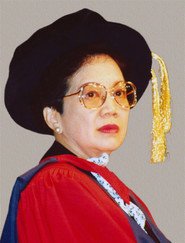

Corazon Conjuangco Aquino found life as a supportive wife interrupted when martial law and authoritarian rule caused her husband, the charismatic "Ninoy" Aquino, to be confined behind bars for speaking out against dictatorship and corruption. Cory, as she is affectionately called, received her education in the Philippines and the United States. She was married to Ninoy in 1954 and later had five children. When Ninoy was assassinated in 1983 minutes after his homecoming, Cory declared that she was "widowed of a man but remained wedded to his cause". The cause was to unite the nation and bring it peace.
The opportunity came in 1986 when she rejected the traditional measures of boycotting and resorted to mobilising two million nationals to show contempt for the regime. The miracle of democratic unity and the solidarity of an effective election campaign won for Aquino the Presidency. She was likened to a pin which deflated the Marcos balloon as People Power surged high in the EDSA Revolution.
However, analysts in 1986 were sceptical that public support without a unified, executive leadership might not be conducive to stability. Would she be able to fill the organisational vacuum and deliver economic performance? In the following six years, the Aquino Administration fought for the ideals of a democratic Philippines and strove hard to grapple with problems such as poverty and social injustice. In her challenge against dictatorship, Cory the devout Catholic secured unreserved support from the Church. It sent the clergy to stop tanks in the February Revolution and supported her policy of reconciliation toward Communist and Muslim insurgencies. Whilst, on the one hand, the seven coup d'etat attempts posed a challenge to the civilian authority, on the other hand, they provided good training ground for Aquino to persuade the services to respect the constitution. The very fact that her successor, President Fidel Ramos, formerly Chief-of-Staff, was democratically returned, speaks for itself. In dealing with the restless military, Aquino needed to strike the balance between administering speedy justice for those implicated and granting amnesty for officers with good records. Other measures included the disbanding of unauthorised fraternal bodies and the appointment of civilians to head defence and intelligence agencies.
Determination to reduce bureaucratic red tape led her to create the Kabisig, or linking arms, movement, so as to improve the delivery of good government services by involving non-government organisations. Likewise, she decentralised the nation's politico-administrative system by enacting the Local Government Code in 1991. It devolved substantial basic services to local governments and institutionalised the participation of the private sector and non-governmental organisations. Such actions demonstrate Aquino's political will to be resilient in tackling major problems. Similarly, the recent decision not to renew the lease with the United States for the use of Subic Bay and Clark Base denotes her sensitivity to national sentiments and contribution to military de-escalation in the region.
The Philippines has had its fair share of economic problems and crises. The Adminstration had to grapple with problems like reducing government subsidies, raising revenues, and generating foreign exchange to pay debts and oil bills. While there was no obvious panacea in sight, the Aquino Government did strive to strengthen the agricultural sector by introducing the Comprehensive Agrarian Reform Program which aimed at redistributing land to some 1.4 million farmers.
Mr Pro-Chancellor, in reviewing her six year rule in "Reflections on our Democracy", Corazon Aquino sees it as the founding years of a new republic which bequeaths to the Filipino people a "peaceful, democratic transition in strict accord with a Constitution". As for an assessment of herself, she has this to say: "I have not always won, but, to the very end, I never shirked a fight and did not lose the last one".
The Aquino experience reminds one of the anti-Draconian campaign in history. In 594 BC, the enlightened Greek aristocrats led by Solon successfully repealed Draco's laws and replaced them with a more humane code and a Constitution which favoured the ordinary people.
Corazon Aquino will be remembered as a president who not only overthrew an unconstitutional and tyrannical regime but also led a transition which reinstituted a democratic government capable of weathering political storms. Today, the University wishes to recognise her contribution to cherishing the ideals of democratic principles. Mr Pro-Chancellor, it is therefore my privilege and honour to present to you Corazon Conjuangco Aquino for the award of the Degree of Doctor of Laws honoris causa.
Citation written and delivered by Professor Lee Ngok, the Public Orator.



